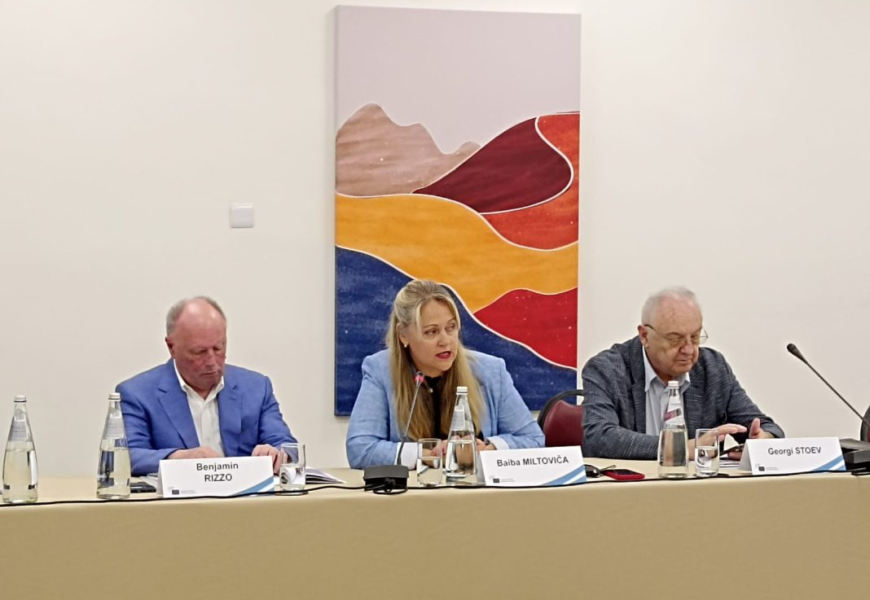The Section for Transport, Energy, Infrastructure, and Informatics (TEN) within the
European Economic and Social Committee (EESC) met in Malta on Wednesday. The
meeting included members of the Maltese Council for Economic and Social
Development (MCESD) and other stakeholders. The primary focus was to discuss
and explore best practices in affordable housing and rare diseases in Malta.
Baiba Miltovica, President of the TEN Section, led the first meeting held at the GWU
building. In her comments to the Horizon, she highlighted the section’s responsibility
to address housing issues. Miltovica noted that many European citizens struggle to
find affordable housing due to a significant shortage of renovated houses. She
emphasized that only 2% of the housing stock in Europe is renovated.
The meeting in Malta was held at the invitation of the Minister for Accommodation
and Affordability, Roderick Galdes. Galdes extended the invitation during the Belgian
Presidency while attending a meeting of Ministers who signed the Liege Declaration.
The purpose was for the TEN Section members to observe Malta’s exemplary
housing programs and practices.
Miltovica also mentioned that the primary goal of such meetings is to gather these
best practices from member states and present them as solutions to European Union
policymakers, including European Commissioner Nicolas Schmit, who is a strong
advocate for increasing the stock of affordable housing.
“There are many stakeholders in this field, such as ‘Housing Europe,’ who are
actively discussing these issues. As a civil society organization, the European
Economic and Social Committee (EESC) can amplify this message across all EU
member states,” Miltovica stated.
The second purpose of the visit to Malta, explained Miltovica, focuses on the social
issue of rare diseases. “We recognize that each member state has limited resources
and national budgets are often insufficient to address the severity of rare diseases.
Therefore, we support a network of doctors, specialists, and medical institutions
across Europe that specialize in specific aspects of rare disease treatment. In some
countries, there are no specific medicines or treatments available for certain rare
diseases,” she added.
In a recent discussion about the significance of a European reference network for
specialized medical institutions, Baiba Miltovica, a representative from the consumer
organization of Latvia in the European Economic and Social Committee (EESC),
highlighted the importance of such networks. She pointed out that in Belgium, there
is a renowned institution dedicated to cancer diseases in the city of Liege.
This example underscores the necessity for doctors and specialists across all EU
member states to be aware of such specialized centres. With a well-established
network, information about these institutions can be efficiently circulated, ensuring
that patients receive the best possible care, no matter where they are in the EU.
Ms. Miltovica is part of a broader European network of consumer organizations,
which plays a crucial role in advocating for consumer rights and ensuring high
standards of consumer protection across Europe. Following a meeting at the George
Washington University (GWU) building, the European members of the TEN
(Transport, Energy, Infrastructure) Section engaged in further discussions with the
Maltese Council for Economic and Social Development in Valletta. These meetings
are instrumental in fostering collaboration and sharing best practices among member
states, which ultimately benefit consumers by promoting safer, more reliable services
and products.
During the same series of discussions, Kevin Camilleri, the Deputy General
Secretary of the General Workers’ Union (GWU), spoke about the housing situation
in Malta. Camilleri acknowledged the significant developments that have been made
but emphasized the ongoing need for private investors to collaborate with the
government. He advocated for the construction of more diverse, sustainable
developments that prioritize both environmental impact and community well-being.
Camilleri suggested that future developments should focus on “SMART” building
techniques that minimize ecological footprints. This includes utilizing open and
creative spaces on the lower levels of buildings, which can be enjoyed by both
residents and the surrounding community. Additionally, he highlighted the importance
of tailoring housing developments to meet actual demand. Instead of predominantly
constructing two- and three-bedroom houses, there should be a focus on building
one-bedroom units where they are needed. Smaller residences that meet essential
needs while maintaining comfort can help make housing more affordable
The creation of a robust European reference network for specialized medical
institutions, as advocated by Baiba Miltovica, and the call for innovative, demand-
driven housing solutions by Kevin Camilleri, both underscore the importance of
collaboration and thoughtful planning in addressing the diverse needs of European
citizens. Whether it’s ensuring that patients have access to specialized medical care
or providing affordable, sustainable housing, these initiatives reflect a commitment to
improving quality of life across the EU.
Rising Rental Rates and Housing Challenges in Malta
In an economy that is attracting a significant number of foreign workers, Malta is
witnessing a continuous rise in rental rates. This phenomenon is not unique to Malta
but is being observed across all European countries. The increasing rental prices are
having a substantial impact on Maltese families who wish to rent, as well as on the
most vulnerable groups in society. Kevin Camilleri, the Deputy General Secretary of
the General Workers’ Union (GWU), recently highlighted these issues, emphasizing
the urgent need for policies to curb abuses in the rental market and to strike a
balance between supply and demand.
The surge in rental rates affects both foreigners and Maltese residents. While
approximately 85% of Maltese people have purchased their homes as an
investment, many others are unable to own property due to various circumstances.
For these individuals, renting is the only viable option, but the high rental prices are
making it increasingly difficult for them to secure housing. This situation is
exacerbated by inflation, which has driven many to share residences to distribute the
cost. As a result, it is not uncommon to find three-bedroom apartments housing six to
eight people.
The overcrowding of rental properties has several adverse effects. Firstly, it can
transform decent living spaces into what are essentially ‘slum areas.’ This
overcrowding leads to a lack of hygiene and structural problems, as buildings are not
designed to accommodate such high numbers of occupants. Social issues also
arise, including conflicts among tenants and with neighbours. Above all, the dignity of
the residents and those around them is compromised, as they are forced to live in
substandard conditions.
To address these challenges, Camilleri called for more robust policies that can
effectively curb rental market abuses. These policies should aim to create a balance
between supply and demand, ensuring that rental prices are kept in check while
maintaining fair treatment for both landlords and tenants. Such measures are
essential to protect the most vulnerable members of society and to prevent the
housing market from becoming unaffordable for the average person.
The rising rental rates in Malta, driven by the influx of foreign workers and economic
factors, are creating significant challenges for both local and foreign residents.
Overcrowded living conditions are leading to hygiene issues, structural problems,
and social tensions, all of which undermine the dignity of those affected. To mitigate
these problems, comprehensive policies are needed to regulate the rental market,
ensuring fair and affordable housing for all. By addressing these issues, Malta can
foster a more inclusive and equitable housing environment for its residents.







